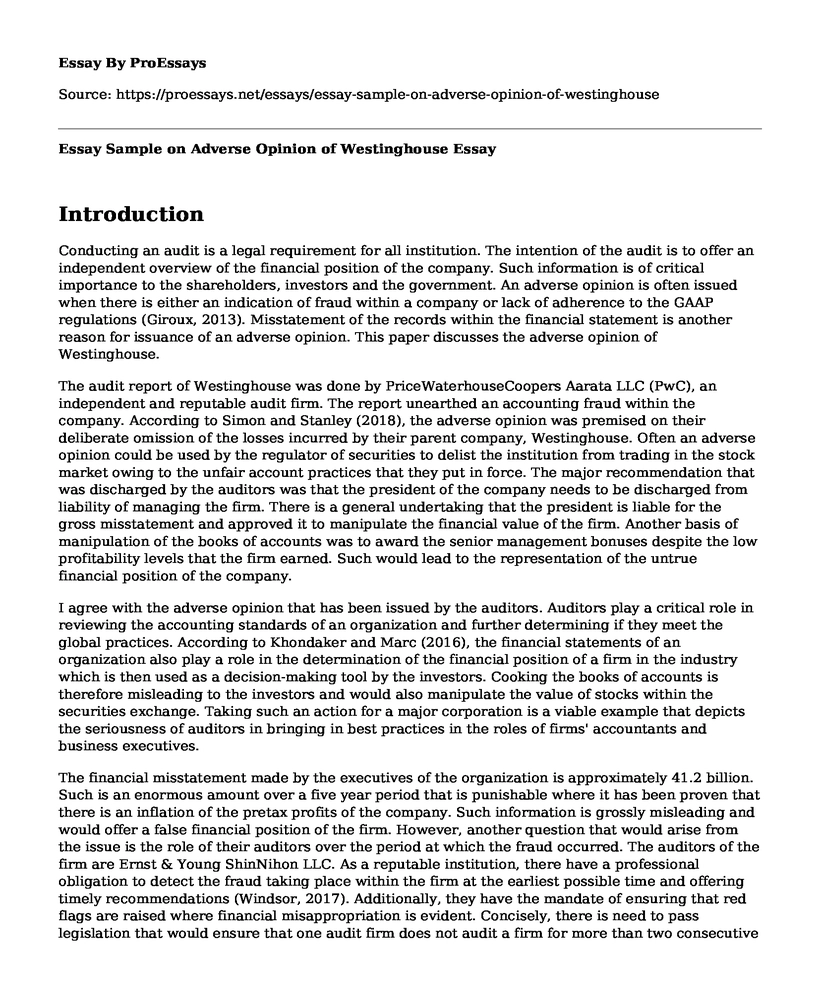Introduction
Conducting an audit is a legal requirement for all institution. The intention of the audit is to offer an independent overview of the financial position of the company. Such information is of critical importance to the shareholders, investors and the government. An adverse opinion is often issued when there is either an indication of fraud within a company or lack of adherence to the GAAP regulations (Giroux, 2013). Misstatement of the records within the financial statement is another reason for issuance of an adverse opinion. This paper discusses the adverse opinion of Westinghouse.
The audit report of Westinghouse was done by PriceWaterhouseCoopers Aarata LLC (PwC), an independent and reputable audit firm. The report unearthed an accounting fraud within the company. According to Simon and Stanley (2018), the adverse opinion was premised on their deliberate omission of the losses incurred by their parent company, Westinghouse. Often an adverse opinion could be used by the regulator of securities to delist the institution from trading in the stock market owing to the unfair account practices that they put in force. The major recommendation that was discharged by the auditors was that the president of the company needs to be discharged from liability of managing the firm. There is a general undertaking that the president is liable for the gross misstatement and approved it to manipulate the financial value of the firm. Another basis of manipulation of the books of accounts was to award the senior management bonuses despite the low profitability levels that the firm earned. Such would lead to the representation of the untrue financial position of the company.
I agree with the adverse opinion that has been issued by the auditors. Auditors play a critical role in reviewing the accounting standards of an organization and further determining if they meet the global practices. According to Khondaker and Marc (2016), the financial statements of an organization also play a role in the determination of the financial position of a firm in the industry which is then used as a decision-making tool by the investors. Cooking the books of accounts is therefore misleading to the investors and would also manipulate the value of stocks within the securities exchange. Taking such an action for a major corporation is a viable example that depicts the seriousness of auditors in bringing in best practices in the roles of firms' accountants and business executives.
The financial misstatement made by the executives of the organization is approximately 41.2 billion. Such is an enormous amount over a five year period that is punishable where it has been proven that there is an inflation of the pretax profits of the company. Such information is grossly misleading and would offer a false financial position of the firm. However, another question that would arise from the issue is the role of their auditors over the period at which the fraud occurred. The auditors of the firm are Ernst & Young ShinNihon LLC. As a reputable institution, there have a professional obligation to detect the fraud taking place within the firm at the earliest possible time and offering timely recommendations (Windsor, 2017). Additionally, they have the mandate of ensuring that red flags are raised where financial misappropriation is evident. Concisely, there is need to pass legislation that would ensure that one audit firm does not audit a firm for more than two consecutive financial years to eliminate the incidence of fraud between the audit firm and their clients.
References
Giroux, G. (2013). Business Scandals, Corruption, and Reform: An Encyclopedia [2 volumes]: An Encyclopedia. ABC-CLIO.
Khondaker, R., & Marc, B. (2016). Accounting Irregularities at Toshiba: An Inquiry into the Nature and Causes of the Problem and Its Impact on Corporate Governance in Japan. Global Advanced Research Journal of Management and Business Studies, 5(4), 88-101.
Simon, A., & Stanley, D. J. (2018). Goodwill impairment: Toshiba's acquisition of Westinghouse. Pepperdine University, Graziadio School of Business and Management.
Windsor, D. (2017). An Integrated Model of Managerial Integrity and Compliance. In Integrity in Business and Management (pp. 136-155). Rutledge.
Cite this page
Essay Sample on Adverse Opinion of Westinghouse. (2022, Nov 08). Retrieved from https://proessays.net/essays/essay-sample-on-adverse-opinion-of-westinghouse
If you are the original author of this essay and no longer wish to have it published on the ProEssays website, please click below to request its removal:
- Essay Example on Disclosure of an Organization
- Role of Foreign Ownership in the Relationship between Board Characteristics and Voluntary Disclosures of Jordanian Banks
- Role of External Audit Quality in the Reduction of Financial Statements Manipulation
- Paper Example on Company Performance Evaluation: Financial Indicators & Timely Control
- Poor Customer Service: A Bank's Bane - Essay Sample
- Essay Example on Creating Financial Stability: A Short-Term Action Plan
- Free Research Paper Sample on Funding for Health Department







